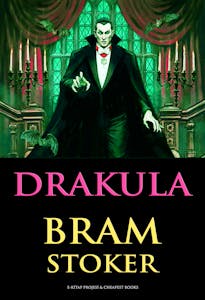Dracula is an 1897 Gothic horror novel by Irish author Bram Stoker. Famous for introducing the character of the vampire Count Dracula, the novel tells the story of Dracula's attempt to move from Transylvania to England, and the battle between Dracula and a small group of men and women led by Professor Abraham Van Helsing.
Dracula has been assigned to many literary genres including vampire literature, horror fiction, the gothic novel and invasion literature. The novel touches on themes such as the role of women in Victorian culture, sexual conventions, immigration, colonialism, and post-colonialism. Although Stoker did not invent the vampire, he defined its modern form, and the novel has spawned numerous theatrical, film and television interpretations.
Characters:
• Jonathan Harker: A solicitor sent to do business with Count Dracula; Mina's fiancé and prisoner in Dracula's castle.
• Count Dracula: A Transylvanian noble who bought a house in London and asked Jonathan Harker to come to his castle to do business with him.
• Wilhelmina "Mina" Harker (née Murray): A schoolteacher and Jonathan Harker's fiancée.
• Lucy Westenra: A 19-year-old aristocrat; Mina's best friend; Arthur's fiancée and Dracula's first victim.
• Arthur Holmwood: Lucy's suitor and later fiancé.
• Jack Seward: A doctor; one of Lucy's suitors and a former student of Dr Abraham Van Helsing.
• Abraham Van Helsing: A Dutch professor; Jack Seward's teacher and vampire hunter.
• Quincey Morris: An American cowboy and explorer; and one of Lucy's suitors.
• Renfield: A lawyer whom Dracula turned mad.
• Brides of Dracula: Three siren-like vampire women who serve Dracula. Although they are popularly known as "The Brides of Dracula", the novel never calls them this.
About Author:
Abraham "Bram" Stoker (1847 – 1912) was an Irish novelist and short story writer, best known today for his 1897 Gothic novel Dracula. During his lifetime, he was better known as personal assistant of actor Henry Irving and business manager of the Lyceum Theatre in London, which Irving owned.
